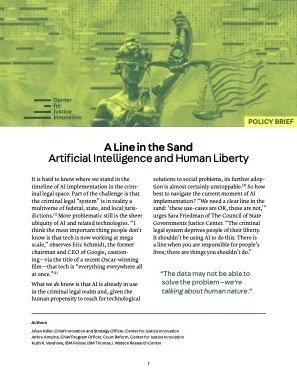A Line in the Sand Artificial Intelligence and Human Liberty
By Julian Adler, Jethro Antoine, Kush R. Varshney
It is hard to know where we stand in the timeline of AI implementation in the criminal legal space. Part of the challenge is that the criminal legal “system” is in reality a multiverse of federal, state, and local jurisdictions.[1] More problematic still is the sheer ubiquity of AI and related technologies. “I think the most important thing people don't know is that tech is now working at mega scale,” observes Eric Schmidt, the former chairman and CEO of Google, cautioning—via the title of a recent Oscar-winning film—that tech is “everything everywhere all at once.”[2] What we do know is that AI is already in use in the criminal legal realm and, given the human propensity to reach for technological solutions to social problems, its further adoption is almost certainly unstoppable.[3] So how best to navigate the current moment of AI implementation? “We need a clear line in the sand: ‘these use-cases are OK, these are not,’” urges Sara Friedman of The Council of State Governments Justice Center. “The criminal legal system deprives people of their liberty. It shouldn’t be using AI to do this. There is a line when you are responsible for people’s lives; there are things you shouldn’t do.”
New York: Center for Court Innovation, 2025. 9p.


